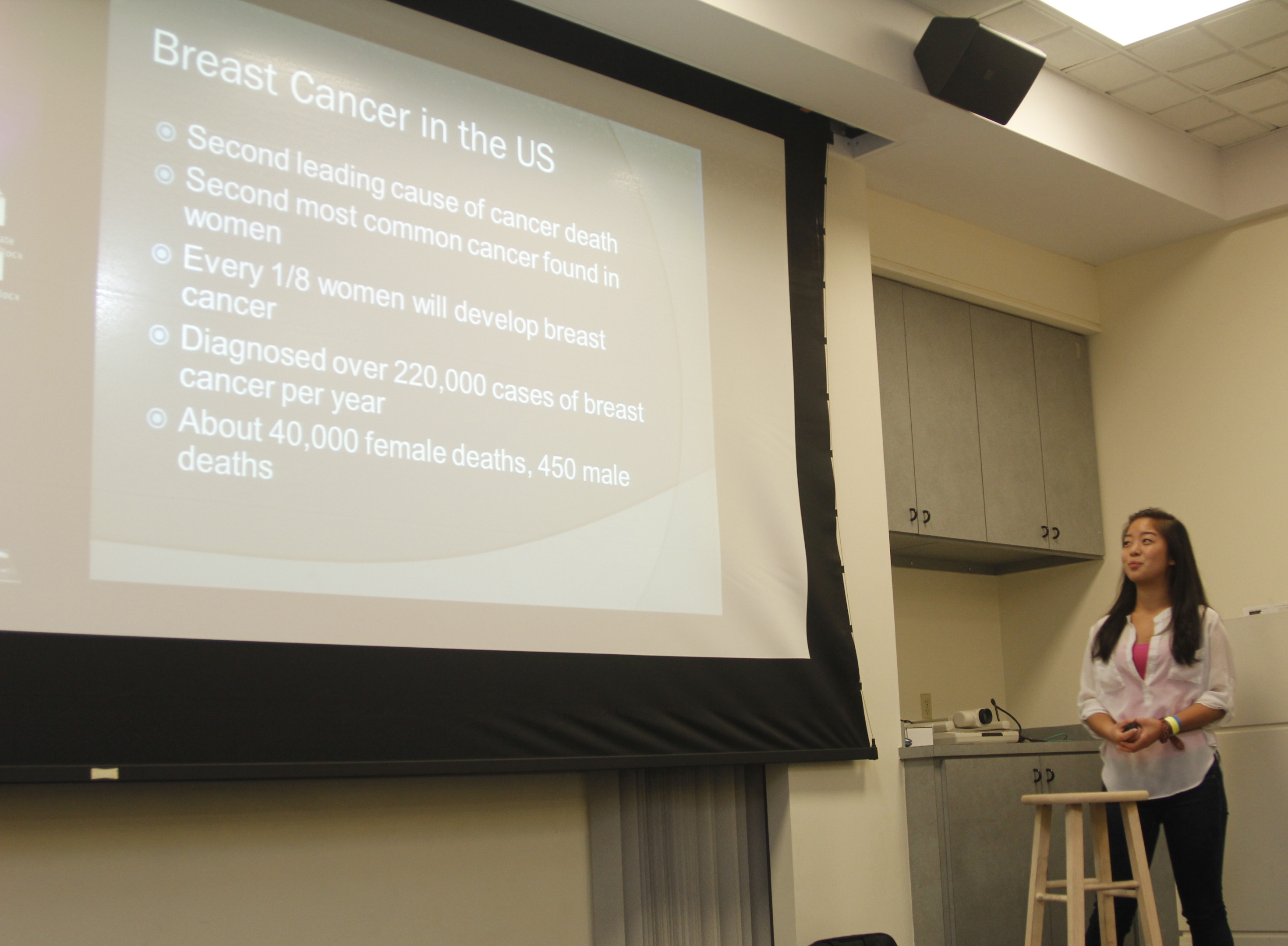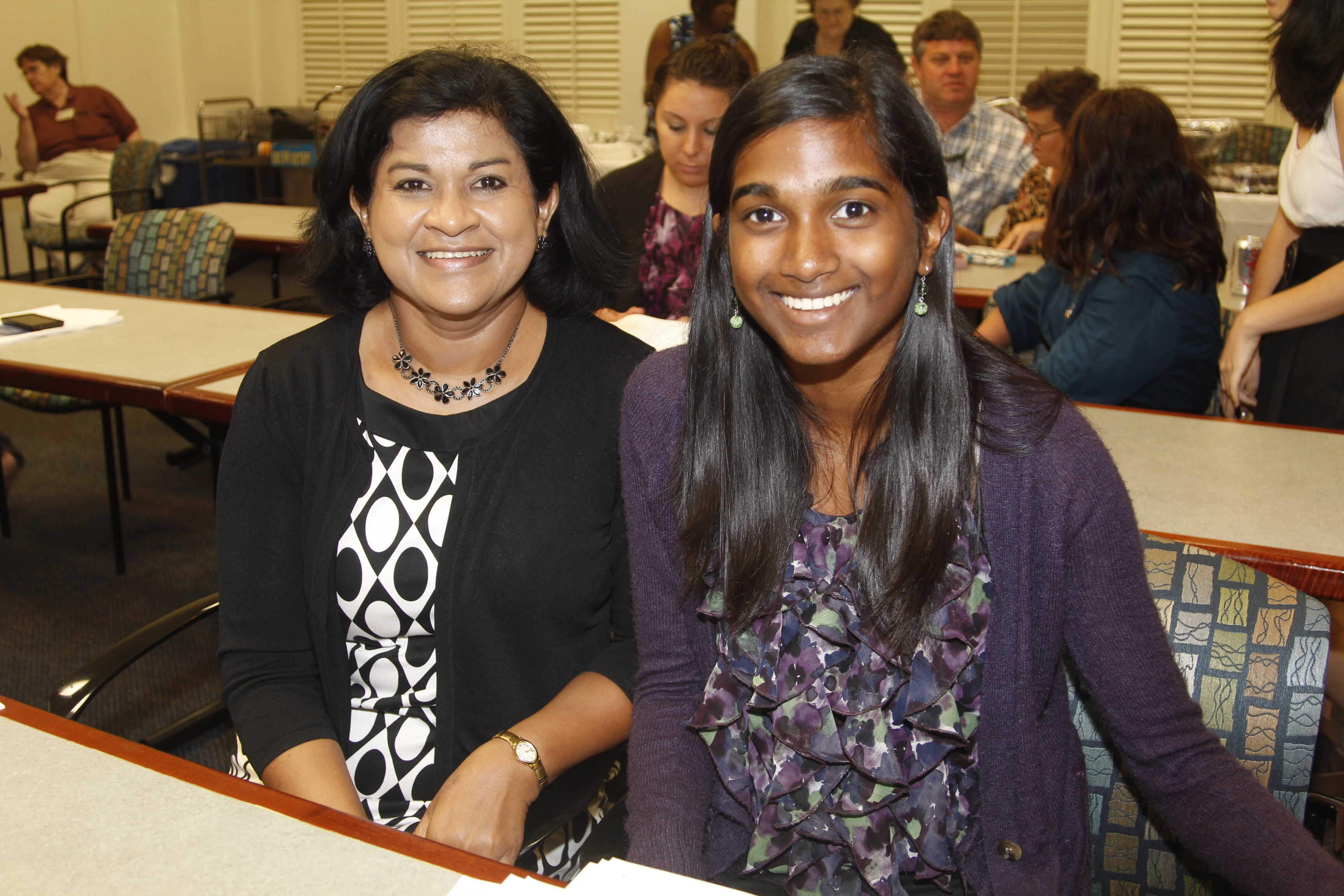|
Some of South Carolina's
brightest high school minds
converged on MUSC's campus for six
weeks this summer to collaborate
and expand their experiences while
conducting biomedical research.
A total of 14 junior students
from the S.C. Governor's School
for Science and Mathematics (GSSM)
participated in MUSC's Summer
Program for Research Interns
(SPRI).
GSSM requires its students to
complete a summer research project
prior to the start of their senior
year. Students choose from
research-oriented programs at
MUSC, College of Charleston,
Furman University, Clemson
University and the University of
South Carolina as well as at
corporate research centers
throughout the state. Participants
may live at home or participate in
a live-in dormitory at the College
of Charleston, coordinated by the
College of Graduate Studies Dean's
Office, while working at MUSC. At
the end of the program,
participants present their
research summaries at the host
institution, at the school's
colloquium and each spring at the
S.C. Junior Academy of Science
before a panel of judges.
 Governor's School
student Rachel Chen explains her
summer research working in the
lab of Pharmaceutical Sciences'
Dr. Patrick Woster. Governor's School
student Rachel Chen explains her
summer research working in the
lab of Pharmaceutical Sciences'
Dr. Patrick Woster.
Sponsoring College of Graduate
Studies Dean Perry V. Halushka,
M.D., Ph.D., has supported this
research intensive program since
early 2000. It is among several of
the college's summer research
program experiences offered to
students from high school to
graduate-level participants. Other
long-term programs include the
Summer Undergraduate Research
Program for undergraduate students
and the Summer Health
Professionals Research Program
targeting medical, dental and
health profession students who are
interested in clinical research.
At the July 20 closing event and
final research presentations,
Halushka thanked parents, faculty,
sponsoring mentors and staff.
"You've raised bright,
enthusiastic and hard working
students, and I commend you for
your parenting success in
preparing these young men and
women to be able to attend a fine
school as with the Governor's
School. These students have given
up most their summer to work and
learn from our faculty. I hope
that this program, combined with
your school's internship program,
has helped ignite a passion for
research that's exciting to those
who choose to move forward in
biomedical research."
GSSM outreach and research
director Randy LaCross is in his
ninth year coordinating research
experiences for Governor's School
students. He also praised students
and the partnership with MUSC.
Students stayed in one of the
College of Charleston dormitories
while conducting their research on
MUSC's campus. "This continues to
be a phenomenal partnership and
experience for our students. The
interaction with scientists and
research staff deepens a student's
knowledge, confidence and
understanding relating to the
nature of science, data collection
and scientific research in a
professional environment. I'm very
proud of their efforts," LaCross
said.
One Charleston area student who
gained a lot during her six-week
experience was Ashani Ranwala, 17.
Last summer, Ashani wasn't sure
what part of the medical field or
scientific research she wanted so
she volunteered to work with
patients and staff through MUSC's
junior volunteer program. This
year, Ashani worked in the lab of
Ken Tew, Ph.D., professor and
chair in the Department of Cell
and Molecular Pharmacology and
Experimental Therapeutics, to get
her research experience. She is
the daughter of Dayan Ranwala,
Ph.D., SCTR Institute, and has an
interest in medicine and cancer
therapeutics. This spring, Ashani
connected with Tew, who is program
leader in Hollings Cancer Center's
Developmental Cancer Therapeutics
Program and serves as the John C.
West Endowed Chair of Cancer
Research.
 Charleston Governor's
School student Ashani Ranwala,
right, and mom, Dr. Dayan Ranwala,
enjoy a break prior to her July 20
research presentation with SPRI
participants. Charleston Governor's
School student Ashani Ranwala,
right, and mom, Dr. Dayan Ranwala,
enjoy a break prior to her July 20
research presentation with SPRI
participants.
Throughout this six-week program,
Ashani shadowed under
post-doctoral fellow Christina L.
Grek, Ph.D., who introduced Ashani
to their team's research and
taught her lab protocols. In turn,
Ashani wrote summary reports and
supplemental readings, conducted
lab experiments working with
protein gels, analyzed data and
attended and observed weekly lab
meetings.
"It was exciting to work in this
lab environment. I learned a lot,"
she said. "At school, our
experiments are more controlled to
help teach a concept. But at MUSC,
this is real science where you
can't predict the outcome and one
doesn't always get perfect
results. Everyone took their time
to help me learn and feel
included."
Ashani's research supplemented
work already conducted by Grek in
Tew's lab. Her research focused on
oxidative stress and how it can
modify proteins. More
specifically, she collaborated on
Grek's pilot study evaluating how
hydrogen peroxide in mouthwash can
change and modify proteins in
cheek cells. This study of
biomarker changes can help
researchers develop more effective
drugs to combat cancer. Ashani,
who eventually wants to be an
oncology physician, asked to
continue with her research work
until Aug. 3.
"I'm grateful for this
opportunity and experience and
want to thank Dr. Tew, his
research team, Dr. Halushka,
Debbie Shoemaker, Mr. LaCross and
others for giving me this valuable
experience."
|



 Governor's School
student Rachel Chen explains her
summer research working in the
lab of Pharmaceutical Sciences'
Dr. Patrick Woster.
Governor's School
student Rachel Chen explains her
summer research working in the
lab of Pharmaceutical Sciences'
Dr. Patrick Woster.  Charleston Governor's
School student Ashani Ranwala,
right, and mom, Dr. Dayan Ranwala,
enjoy a break prior to her July 20
research presentation with SPRI
participants.
Charleston Governor's
School student Ashani Ranwala,
right, and mom, Dr. Dayan Ranwala,
enjoy a break prior to her July 20
research presentation with SPRI
participants.